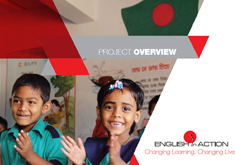To help get millions of people in Bangladesh excited about learning English, the television program makers inside BBC Media Action had to invent a new television series.
After hours of brainstorming, the producers settled on a series all about ‘real people’: no actors, no drama on a stage, no sets and props. We wanted to see into the life of a variety of people throughout the country, all of whom wanted to learn English to improve their own livelihoods.

Under our BBC Janala flag we decided to produce eight new, half-hour factual entertainment shows, inspired by the huge popularity of ‘reality’ series throughout the world. “There’s nothing new about reality shows,” I hear you cry but, in Bangladesh, believe me that this is heading into new territory. And, just to make it even more challenging, we’ve opened our door of opportunity to first time producers, directors, writers, assistant editors and production assistants to make this prime-time television series.
As always in broadcasting, we have to develop and write the idea, research the audience and format the show beforetesting it out, and we do this by making a ‘pilot’ episode. This is a one-off program that lets us discover if the idea transfers from paper to screen and tells us whether the target audience like it or not.
After weeks of development and planning, filming took place over a three day period, in the smallest location imaginable.
Inside Mita’s Hair and Beauty Parlour, the recording began and we were surrounded on all sides by enormous wall mirrors. Lights, cameras and mirrors do not mix well: anywhere we aimed the cameras, we saw reflections of the crew, the lights, the boom mics and more. Even lying on the floor underneath the camera tripod, a mirror would somehow reflect you round the parlour and pop you into the lens.
Our non English speaking contributor was the owner Mita, who started off as an assistant in posh parlours, with years of making little money. Now, through hard work – and taking a huge business gamble in the process – she runs her own parlour.
Inside was our tall, glamorous teaching mentor, Samia, eight invited customers getting make-overs, Mita’s five assistants and a crew of ten: so you can visualise the fun and games.
Our other locations for the pilot show included Mita’s home, the zoo, the streets of Mirpur, a very posh hair salon, a newly opened riverside restaurant, five sari shops and a supporting cast of family, friends and colleagues to bring more depth to the story of why Mita wanted to learn English: to grow her own business and to be able to communicate with the many foreign customers that are now in Dhaka.
After editing and sound mixing the pilot show was ready to test and the research team took it around the country to find out if the audience followed the story and could understand the English lesson that was the backbone of the show.
Luckily, they did; and their feedback gave us the vital information we needed to make improvements to the format and to make sure the series worked for the BBC Janala target audience.
Now, we have found eight main contributors – all very different and from all over Bangladesh – who want to tell their own stories about how learning English is transforming their own business and lives.
Cameron Miller, Creative Director, BBC Media Action






